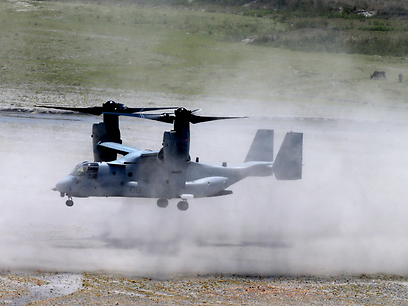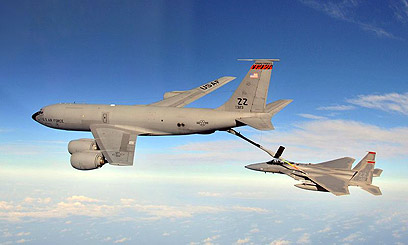US gains more from arms deal
Analysis: Americans building Mideast coalition to assist them in case they will have to act in Iran or Syria
The Middle Eastern arms deal announced by the New York Times last week is not the largest the US has ever signed with the region's countries - in terms of money, the amount of weapons and the different kinds of weapons involved. But this deal, in the framework of which Israel is expected to purchase advanced refueling tanker planes, a number of V-22 Osprey troop transport aircraft, radars for fighter jets and missiles designed to take out air-defense radars, is by far the deal which is the hardest to implement, politically speaking, for any American government, and particularly for the Obama administration.
This deal gives the Saudis and the United Arab Emirates the ability to attack targets on the ground from a great distance and with great precision. In the past the Americans vowed never to provide such capabilities to oil-rich Arab states which foster radical Islam. But in this deal they are doing precisely that – big time. Two years ago the US signed a deal with Saudi Arabia worth more than $80 billion for the supply of F-15 jets. Now these warplanes will also have the ability to attack targets on the ground from dozens of kilometers away – perhaps more than 100 kilometers away. Such targets exist in Iran – but also in Israel.
Congress would never have approved such a deal because Saudi Arabia - where Osama bin Laden was born – is the birthplace of radical Islam, and also because these weapons may fall into the hands of Jihadists or Salafists in the event of a revolution. The danger to Israel and American interests in the region should such advanced weapons end up in the hands of extremist Islamic elements requires no further explanation.
There is no way Congress would have approved this connection between advanced F-15 warplanes and long-range, accurate weapons without sweetening the pill for the American lawmakers with Obama's visit to Israel and by offering Israel some 'biscuits' as well. The Americans will sell Israel missiles capable of dealing with SA-17 batteries, different kinds of mobile surface-to-air missiles, as well the aforementioned refueling planes, transport aircraft and radars for warplanes.
The timing of the arms deal and of Obama's visit to Israel is not coincidental. While the deal is the result of the hard work of former defense minister Ehud Barak and former US defense secretary Leon Panetta over a period of months, it is aimed at providing Israel with capabilities it currently lacks and at improving the relations between Jerusalem and Washington, which hit an all-time low following the elections in the US.

V-22 Osprey troop transport aircraft (Photo: AP)
Obama's visit to Israel was meant to remove any last objections Israel and its friends on Capitol Hill may have had. It seems that Obama succeeded not only in getting Prime Minister Netanyahu to apologize to Turkey, he also got the final approval for the deal, which may have other aspects to it that have yet to be revealed.
The Obama administration stands to gain the most from the deal. The agreement with the UAE, and mainly with the Saudis, which will apparently be signed this week, will provide extensive work for aviation and weapons plants in the US – plants which were supposed to be hit hard by the substantial cuts in the Pentagon's budget. This was the reason for Defense Secretary Chuck Hagel's visit to the region. The arms deal also boosts the self-confidence of Israel and the Arab Gulf states in the face of the Iranian threat.

KC-135 refueling tanker plane
The US is giving its allies in the Middle East the ability to deal with conventional threats –such as the possibility that extremist Islamic elements in the region will get their hands Syria's chemical weapons or that Salafist groups in Sinai will seize control of advanced weapons. The aid package will also help Israel react in the event that Hezbollah manages to obtain advanced anti-aircraft batteries it does not have at this point.
In addition, should the US decide to use force against Iran, it will be able to do so with the cooperation of its allies in the region. In other words: The Americans are building a regional coalition which will be able to assist them in case they will have to act in Iran, Syria or other countries.
The supply of KC-135 refueling tanker planes will extend the "long arm" of Israel's military. According to foreign sources, Israel currently has nine refueling planes which are actually converted Boeing 707 passenger planes. But the advanced American refueling planes would dramatically increase the Israeli Air Force's ability to activate an aerial force for a long period of time and increase the number of strikes this force could launch – in Iran and northern Syria, for example.
The problem is that these refueling planes will be transferred to the Air Force only a few years from now, when it is entirely possible that Israel will have to deal with the Iranian threat much sooner. But there is no doubt the KC-135 planes will significantly boost the Air Force's capability to use its full aerial force against remote targets.
The V-22 Osprey troop transport aircraft allows Israel to operate in remote locations and also contribute to the protection of Israel's offshore gas fields.
In conclusion, Israel will see the fruits of the deal a few years from now, so the aircraft and systems it will receive as part of the deal will most likely not be used by Israel in any attack on Iran that is launched before the end of 2016. This way, the Americans are showing Israel they are helping it maintain the qualitative edge without encouraging Israel to launch a go-it-alone strike in Iran.
The deal includes a clause stating that Saudi Arabia and the UAE are permitted to use the smart bombs they will receive only under American supervision, and it seems that the US will keep the technological components needed to activate these bombs. But Israel cannot ignore the fact that countries inclined toward radical Islam will possess smart weapons technology and the F-16 and F-15 warplanes needed to make actual use of this technology. However, as far as Israel is concerned, the most important aspect of the deal is that it will improve its relations with the US.










